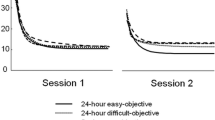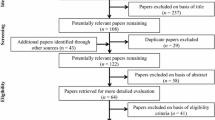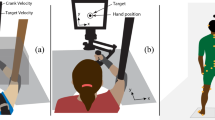Abstract.
This study tested the hypothesis that subjects improve their relative stability as they learn a dynamic pulling task. Healthy adult subjects practiced making brief horizontal pulls (<300 ms) on a handle to a range of target forces ranging from 20 to 80% of their estimated maximum for 5 days. They were instructed to always keep their feet flat and begin and end their motion in an upright posture. In order to do this, subjects had to develop the appropriate body momentum prior to the pull and then recover their balance following the pull. We analyzed relative stability during balance recovery, using two measures: spatial safety margin (minimum distance of the center of pressure, COP, to the edges of the feet) and temporal safety margin (minimum extrapolated time for the COP to reach the edges of the feet). We hypothesized that: (1) spatial and temporal safety margins would be uncorrelated; (2) safety-margin means would increase with practice; and (3) safety-margin standard deviations would decrease with practice. Two experiments were conducted: one where subjects practiced three force targets and positioned their initial COP in a small window, and one where subjects practiced two force targets with no initial COP constraint. Results showed that spatial and temporal safety margins were correlated but shared less than 6% variance, indicating that they reflected different aspects of control. Safety-margin averages increased with practice and standard deviations decreased with practice, indicating that the stability of balance control in the execution of this task became more robust. We suggest that the nervous system could use safety margins in both feedback and feedforward control of balance.
Similar content being viewed by others
Author information
Authors and Affiliations
Additional information
Electronic Publication
Rights and permissions
About this article
Cite this article
Patton, J., Lee, W. & Pai, YC. Relative stability improves with experience in a dynamic standing task. Exp Brain Res 135, 117–126 (2000). https://doi.org/10.1007/s002210000500
Received:
Accepted:
Issue Date:
DOI: https://doi.org/10.1007/s002210000500




